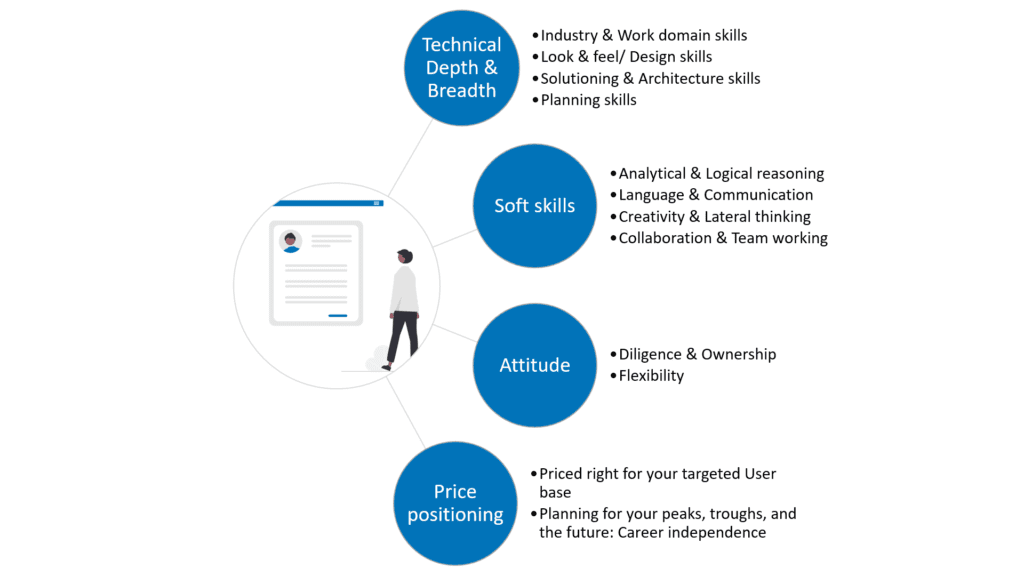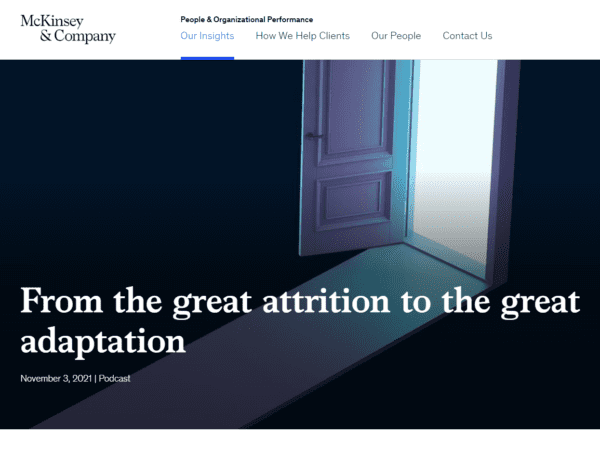Prelude
This article was written quite a while ago, well before Covid hit us. But with several changes in the ecosystem, this Blog post is due for a revamp – so here you go.
Introduction
As a freelancer, you have the option to work in your comfort zone, on jobs that do not push your brains hard; or: You can aspire to work on more complex assignments that stretch you, but leaves you satisfied at the end when you succeed.
In the former case, you can simply continue as you are at your own pace & level; In the latter, you grow & become more fulfilled — and you generate more earnings. All the while, working at your convenience.
This article is targeted towards those of you who would prefer to follow the latter path.
By the way, there is nothing wrong with choosing either path — Its just a matter of what you want, vs how much you can give.
An important point to note here, is: This article is developed largely from the Business’ perspective, and what Business stakeholders would want from its freelancers. In the Gig Economy, freelancers are replacing or augmenting traditional staff to a far greater extent, but the capabilities & behaviors that differentiate the “truly valuable employees” from other employees would also continue to differentiate Freelancers in this new world. And that’s the essence to growing your freelancing career.
However, some attention is also provided to the Freelancer’s perspective from the Risk/ Reward angle and long-term planning.
So what are the key factors that Businesses would look for in its “preferred” freelancers ? Even more importantly, what are the factors which would ensure that Businesses offer these freelancers repeat work ?
Some Qualities of that “Great Freelancer”

Technical depth and breadth
Obviously, technical skills are the starting point for the selection of a Service provider. If you do not have the requisite depth and breadth of technical skills (including the insights into the industry that you work in, as well as the depth of skills in your work domain) as demanded by the Business & the Jobs in question, you do not even get into the running for capturing business.
Technical skills can be categorized into:
- Work domain skills: This could be Programming languages or Tech stacks if you are a Programmer; It could be your vocabulary, crispness & grammar skills if you’re a writer; etc.
- Industry skills: Your insights into the industry that you work in will streamline your communications & understanding during dialogues with your customers – In the absence of industry awareness, you may end up like like an Englishman in Paris, unable to communicate and understand.
- Look & feel/ Design skills: This covers the overall presentation that you are able to achieve for your offerings & your deliverables. Packaging is critical for achieving customer delight.
- Solutioning & Architecture skills: Although this sounds like an engineering terminology, the intent is to convey the depth of thinking that you would put into your deliverables. Plan your deliverables so that each component fit and dovetail into the adjacent components, and the overall deliverable is effective and on the point.
- Planning skills: Getting the right big picture right,and then diving deep into the forest to the trees level requires good planning.
An additional note about planning: As a freelancer, you have to be prepared to work for multiple customers/ work on multiple jobs, simultaneously. You also have to give your Customers predictability of when they can expect your work to be completed. For achieving these objectives, you have to ensure that you are able to plan your work in detail, and track your execution against the plans developed. Without this structure, you would end up in chaos, missing timelines & making mistakes as you scramble to catch up.
Using a project or task management tool may be helpful here, to bring order to the chaos. Here’s an article shares the top Project Management tools for freelancers:
Contently.net: The 10 Best Project Management tools for Freelancers
Soft skills
Soft skills cover a variety of areas, such as: Analytical and logical reasoning; Language & communication; Creativity and lateral thinking; Collaboration & team working; etc.
Analytical & Logical reasoning
Being analytical forms the backbone of skills needed by any Services resource. Being able to understand the Customer’s needs, decompose it to component tasks, and define appropriate validation steps to ensure accurate capture of Customer needs, would require analytical thinking & logical reasoning skills.
I came across this interesting article on analytical thinking & how you can improve your abilities in this area:
Mindvalley: Analytical skills – Here’s how they can level up your Resume
Language & Communication
The ability to communicate effectively — understand the other party completely with understanding of the nuances of verbage used, AND communicate your positions and thoughts accurately and crisply to the other party — would be critical for a freelancer’s success.
If you were an employee of the same business, you would have had the flexibility to go back & engage with your counterparts, with no serious detriment; But as a freelancer, you are not given that flexibility, and you have to showcase your capabilities the first time around.
Further, as a freelancer working for multiple customers, you also may not have the bandwidth to perform too many follow-ups.
Another aspect of Language skills is the awareness of industry/ domain terminology. If your Business customer has to explain what each phrase or word means, time and again, you would not be given an opportunity for repeat Services with that customer.
Creativity & Lateral thinking
We all know that each work item that we receive can probably be completed using different strategies and work paths. What makes you stand out will be your ability to think out-of-the-box & deliver solutions that are simple and effective, and have your Customers go “Wow !”.
Here are a couple of articles that you can read, to improve your creative thinking:
Entrepreneur.com: 5 Science-backed ways to boost your creativity
Inc.com: 9 ways to dramatically improve your creativity
ToolsHero: Six Thinking hats technique from Edward de Bono.
Collaboration & Team working
Freelancing traditionally is a lonely job, with one person working on a specific assignment, and disconnected from the community.
However, if you want to work on complex jobs & projects, it is highly likely that you would be required to work as part of a team that brings to bear multiple team members who bring a variety of skills to the table. They may be freelancers or consultants from agencies, or they could be employees of the business that has employed you. You have to prepare hard, and learn how to work effectively as part of teams, in order to be successful in such situations. You have to understand team dynamics, and be open to other points of view.
You also have to become culturally aware, so that you are effective as part of a multi-cultural team. This aspect can be significantly underestimated, and requires adequate preparation.
Here are a couple of articles that may help you in this space:
HBR: How to collaborate effectively if your team is remote
Forbes: 10 ideas to integrate remote and in-person teams
OnTrack International: International teams lack cultural awareness
Attitude
Your attitude is key to building strong business relationships, repeat businesses, and a deep work pipeline.
An employee does not have to prove himself/ herself every day – He/ she is done with that after the hiring is done. Obviously one needs to deliver effectively, but there’s no interview every second day.
As a Freelancer, on the other hand, you get in front of new Customers every day. You have to constantly build new bridges. Your technical capabilities will only go so far with building successful relationships – You have to also focus on polishing your “face in the mirror”.
Diligence, Ownership, & Flexibility
In a traditional freelancer’s world, you deliver what you have committed to, and nothing more.
However, if you are open to being flexible & giving, then the trust & comfort that the Business has in you increases dramatically.
My point here is not that you always deliver 10% or 50% or 100% more than what you have committed — it is that when the Customer hits a roadblock, or if the Customer ask is not the best option possible, it may be good if you can suggest workarounds & different solutions that can eventually lead to a better closure. You also always keep an eye out for your Customer’s interests, and design/ develop your solutions by always thinking from the shoes of your Customer, so that he/ she receives the best value from you.
This behavior needs you to be diligent & constantly looking for win-win solutions for both of you.
Price positioning
While you ensure that your services are adequately priced, please also ensure that you are aligned to the rest of the industry, while obviously keeping in mind your skill levels vis-a-vis the industry norms. If you price yourself too low, you would not be valued; and if you price yourself too high, without the necessary networks to keep the work pipeline open, you could find yourself priced out of business.
I read this great Medium article about different pricing models in the freelancing world, which I am confident you would enjoy.
Another critical aspect of Freelancing is the peaks & troughs of work that you may encounter, specially before you stabilize in that career path and do not yet have a stable of steady customers feeding you work. You also do not get to enjoy those standard benefits that a full-time employee may enjoy – Medical/ Health insurance, Retirement benefits, etc. So a Freelancer also needs to plan for these shortfalls, as well.
I came across a very relevant and current article that covers Career independence, and thought it would be apt to include that here.
The impact of Millennials & Generation Z
There is an influx of young men and women streaming into the workplace today – the Millennials and Generation Z. They are strongly independent, want autonomy, and prefer to work in flatter Organizational structures. They want to choose where they would work, for whom, and when.
They are a growing tribe called Digital Nomads. The following article throws light on who is a Digital Nomad, and the Pros/ Cons of being one.
MasterClass.com: What Is a Digital Nomad? Pros and Cons of Digital Nomad Life
The point here is: There is an entire generation of workers who are ripe to move into that more flexible model of working, leveraging full-time or part-time freelancing. Businesses also should sit up and take note – The game plan for Talent management is centred around a battlefield that is changing rapidly. On the other hand, the digital nomads are not exempt from the high expectations of businesses, and to survive and grow, need to take note as well.
Conclusion
Freelancing is a benefit as much as a way of life.
More and more people are opting to move to Freelancing, as it enables them to work for themselves, and removes limitations such as location constraints & work timing constraints, freeing up their day as they deem fit.
Businesses are also opting to adopt freelancing more & more, to enable their cost takeout & convenience needs, while fighting their inherent, natural reluctance to freelance — since remote working naturally increases lack of visibility & control of the work performed & the quality/ timeliness of services & deliverables supplied.
So freelancers have to do their extra bit, to ensure that Businesses are able to get over this natural reticence to adopting and increasing freelancing.
What would follow is a great win-win for both Businesses & Freelancers.
Please feel free to jump in & offer your valuable suggestions on how Freelancers can grow faster in their career, in the Comments section below.
Follow-on actions
Please do read the following related articles, which you may find interesting, as it caters to the Business perspective of freelancing:
– “How to drive more value from Freelancing: An Evolution of Freelancing models” (Link).
– “Do you want to safely increase adoption of Freelancing in your Business? Assess your readiness first” (Link)



